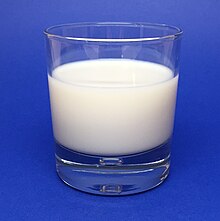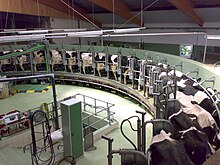
Back Melk Afrikaans Milch ALS ወተት Amharic Leit AN Meolc ANG حليب Arabic ܚܠܒܐ (ܕܝܘܒܐ) ARC لبن ARZ গাখীৰ Assamese Lleche AST


Milk is a white liquid food produced by the mammary glands of mammals. It is the primary source of nutrition for young mammals (including breastfed human infants) before they are able to digest solid food.[1] Milk contains many nutrients, including calcium and protein, as well as lactose and saturated fat.[2] Immune factors and immune-modulating components in milk contribute to milk immunity. Early-lactation milk, which is called colostrum, contains antibodies and immune-modulating components that strengthen the immune system against many diseases. The US CDC agency recommends that children over the age of 12 months (the minimum age to stop giving breast milk or formula) should have two servings of dairy (milk) products a day,[3] and more than six billion people worldwide consume milk and milk products.[4]
As an agricultural product, dairy milk is collected from farm animals, mostly cattle. In 2011, dairy farms produced around 730 million tonnes (800 million short tons) of milk[5] from 260 million dairy cows.[6] India is the world's largest producer of milk and the leading exporter of skimmed milk powder.[7][8] New Zealand, Germany, and the Netherlands are the largest exporters of milk products.[9] Between 750 and 900 million people live in dairy-farming households.[4]
- ^ Van Winckel M, Velde SV, De Bruyne R, Van Biervliet S (2011). "Clinical Practice". European Journal of Pediatrics. 170 (12): 1489–1494. doi:10.1007/s00431-011-1547-x. ISSN 0340-6199. PMID 21912895. S2CID 26852044.
- ^ "Milk". The Nutrition Source. Harvard T.H. Chan School of Public Health. July 2021. Retrieved April 17, 2024.
- ^ "Cow's Milk and Milk Alternatives". Centers for Disease Control and Prevention. May 25, 2022. Archived from the original on March 13, 2022. Retrieved March 10, 2022.
- ^ a b Hemme T, Otte J, eds. (2010). Status and Prospects for Smallholder Milk Production: A Global Perspective (PDF). Food and Agriculture Organization of the United Nations. Archived (PDF) from the original on January 19, 2012. Retrieved December 1, 2011.
- ^ "Food Outlook – Global Market Analysis" (PDF). Food and Agriculture Organization of the United Nations. May 2012. pp. 8, 51–54. Archived (PDF) from the original on May 22, 2012. Retrieved August 1, 2012.
- ^ "World Dairy Cow Numbers". [FAO]. January 14, 2014. Archived from the original on March 23, 2014. Retrieved March 23, 2014.
- ^ Anand Kumar (October 21, 2013). "India emerging as a leading milk product exporter". Dawn. Pakistan. Archived from the original on June 30, 2015. Retrieved June 3, 2015.
- ^ "Government scraps incentive on milk powder exports to check prices". Economic Times. Times of India. Press Trust of India. July 9, 2014. Archived from the original on June 30, 2015. Retrieved June 3, 2015.
- ^ "Top Milk Exporting Countries". Archived from the original on July 21, 2020. Retrieved July 3, 2019.